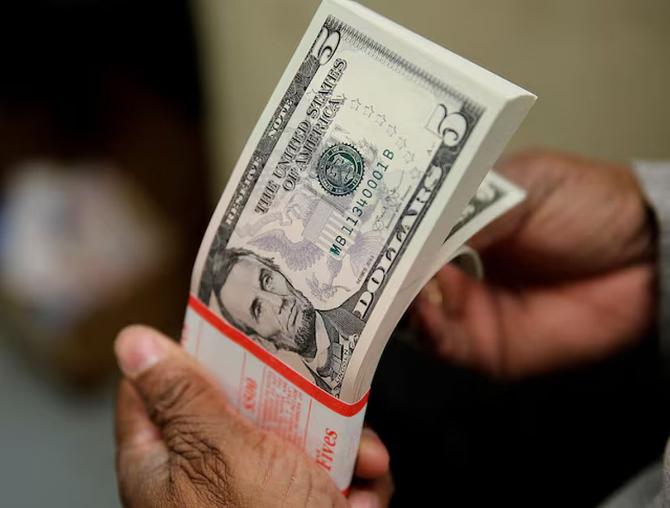A combination of factors, including heavy investments in US Treasury bonds and dollar sales at a healthy profit, facilitated the Indian central bank in transferring a record surplus of Rs 2.11 trillion to the government for 2023–24 (FY24).

The RBI’s dollar purchases increased in FY24, supported by robust capital inflows endorsing the economy’s health.
Economists noted that these dollars were invested in US Treasury securities, with yields rising due to monetary policy tightening — reflecting the higher-for-longer stance of the US Federal Reserve — resulting in substantial interest income for the RBI from foreign assets.
In FY24, the RBI’s foreign exchange (forex) reserves surged by $68 billion, the highest in five years.
As of March 29, 2023, India’s forex reserves stood at $645.6 billion, compared to $578.4 billion on March 31, 2023.
Madhavi Arora, lead economist at Emkay Global Financial Services, highlighted, “Much higher interest income from foreign (+ domestic) assets (the estimated weighted average yield of shorter tenure foreign treasuries) increased by 220-250 basis points in FY24 from 2022-23 (FY23).
"There was also an expansion of holdings of foreign currency assets.”
As of March 31, 2024, the RBI had invested $240.6 billion in US Treasuries, marking a nearly $20 billion increase between October and March, according to data from the US Department of the Treasury.
Domestically, the liquidity situation, which shifted into deficit mode in September 2023, also contributed to the central bank’s higher income.
When liquidity enters deficit, the RBI lends to banks, earning interest.
Soumya Kanti Ghosh, group chief economic advisor at State Bank of India, projected, “Nearly 60–70 per cent year-on-year increase in the RBI’s income is expected to be from interest income from foreign securities as well as exchange gain from forex transactions.
"The sharp jump in the surplus amount could be attributed to higher income from the forex holdings of the central bank, among other factors.”
“The increase in the price of gold also added to the overall expansion of the RBI balance sheet,” he added.
For FY24, Ghosh projects RBI’s income to be Rs 3.75 trillion to Rs 4 trillion.
Intervention in the forex market also contributed to the higher income.
According to RBI data, it sold $153 billion in the forex market in FY24.
While the RBI sold dollars at the current market price, the weighted average cost of the dollar was much lower.
Foreign currency assets account for 68 per cent of total assets, with government securities making up 19 per cent.
Around 82 per cent of foreign currency assets are held as securities, with the rest as deposits with other central banks and the Bank for International Settlements, IDFC First Bank said in a note.
Gaura Sen Gupta, an economist with IDFC First Bank, remarked, “The historical cost of a dollar purchase is tracking at 65, substantially below the current spot rate. Hence, despite the lower quantum of gross dollar sales in FY24, revenues from forex transactions will be substantial (albeit lower than last year).”
With the surplus nearly double what the government had budgeted, discussions within the financial sector revolve around how the windfall gain could be utilised.
On one hand, there is a call for increased capital expenditure (capex) by the government, while on the other, there is an expectation of reducing borrowing and maintaining fiscal discipline.
Kotak Securities said in a report, “While adhering to the fiscal consolidation path is now relatively easier, there is space to alter the budgeted receipts and/or expenditures.
"The government can continue with its capex thrust by increasing allocations to roads, railways, and defence.”
There’s also speculation that the government may not utilise the surplus for expenditures, given that it’s a post-election year.
Ambit Capital noted, “This provides the government with a fiscal space of 0.3 per cent of gross domestic product.
"Given this is a post-election year, we do not expect the government to use this for extra expenditure; rather, it is likely to use this to compress the fiscal deficit and reduce borrowing,” adding that the surplus could also cushion against any tax shortfall.
Given the factors contributing to this bumper surplus, such as interest earnings from foreign assets and dollar sales, similar advantages may not accrue.
The interest rate cycle, still elevated, may change direction, and the weighted average cost of dollars may no longer be as attractive.
Data shows the RBI sold only $10 billion between January and March — which means $143 billion was sold in the first nine months of FY24, of the $153 billion sold in the entire financial year.
All eyes now turn to the full Union Budget, likely to be presented in July, to see how the new government uses this Rs 2.11 trillion bonanza from the central bank.












 © 2025
© 2025